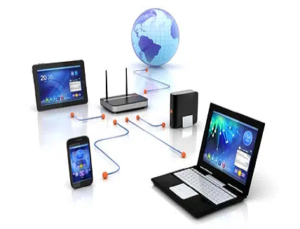
During 1950s, all computers were similar in one respect. They had main memory, a central processing unit (CPU), and peripherals. The CPU, a main memory was central to the system. Since then a new generation of computing has emerged in which computation and data storage need not to be centralized. A user can retrieve a program form one place, run it on any of a variety of processors and transmit the result to a third location.
Merging of computer and communications has had a profound effect in the way computer systems are organized. The concept of “computer center’’, a room with large computer where users bring their work for processing is now completely out of fashion. Old model of a single computer performing all the organization’s computational requirements has been changed by one in which a large number of separate but interconnected computers do the job. These systems are called computer networks.
The term computer network refers to an interconnected collection of autonomous computers. Two computers are said to be interconnected if they are able to exchange information. The connection need not be via a copper wire; lasers, microwaves and communications satellites can also be used .By requiring the computers to be autonomous we wish to exclude form our definition ,systems in which there is a clear master/ slave relation .if one computer can forcibly start ,stop or control another slaves ,is not a network; nor is a large computer with remote card readers, printers and terminals.
There is a considerable difference between a distributed system and a computer network. The Key distinction is that in a distributed system, the existence of multiple autonomous computers is transparent (i.e., not visible) to the user. Here, noting has to be done explicitly; it is all automatically done by the system without the user knowledge. With a network a user must explicitly on onto one machine, explicitly submit on remotely, explicitly move files around and generally handle all the network management personally.
In Effect a Distributed system is a special case of a network, one whose software gives it a high degree of cohesiveness and transparency. Thus the software gives it a high degree of cohesiveness and transparency. Thus the distinction between a network and a distributed system lies with the software (especially the operating system), rather than with the hardware.
Advantages Of Networking:-
- Faster Data Transfer :- A network provides the means to exchange data among computers and to make programs and data available to the people.
- Resource Sharing: – It permits the sharing of resources of the machines with the goal of making data available to everyone without regard to the physical location of the resource and the user.
- Distributed Processing: – Networking provides the facility of distributed processing among the multiple autonomous computers.
- Higher Reliability and Accuracy: – One of the aims of networking is to provide reliability by having alternative sources of supply. Networking also provides the critical function of back-up.


















